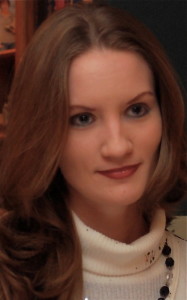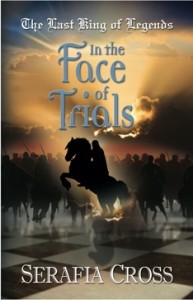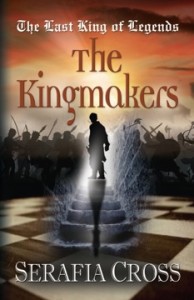Author Interview With Kelly Blanchard
 So, what exactly do you write? I write historical fiction, fantasy, and science fiction.
So, what exactly do you write? I write historical fiction, fantasy, and science fiction.
How would you describe yourself in a short third person bio? Aside from her daily writing to remain on the cutting edge of her craft,Kelly Blanchard mentors writers in the craft—often opting to co-write with them to show by example how it’s done rather than merely telling them what they should do. She challenges the clichés and embraces originality, and she insists to be shown the story and its characters and not merely told of them.
You also write under the name Serafia Cross. What made you decide to use a pseudonym? My actual name didn’t seem to fit the story of the Crusades, so I chose to use Serafia Cross instead—names from my genealogy.
What made you initially want to write? Has your motivation changed since then? My initial reason to write is because I always had stories in my head, and I wanted them out! My imagination always swirled with ideas, and it hasn’t changed.
What do you think is the most important part of writing? The most important part of writing is showing and not telling. What I mean by this is not using dialogue tags such as ‘said’ or ‘asked,’ because these are crutches for the writer and an excuse to not work so hard on showing. Take those out, replace them with body language of the characters, and the story blossoms.
What is your favourite part of writing? Oh this is so hard for me to decide. Every part is my favourite! I think though, I would have to say the most favourite part is coming up with all the ideas and plotting them out even before any words are written. It’s all the excitement of discovering the cast, the twists and turns, how everyone is connected, and how they’ll interact with each other. Foreseeing how it will play out really brings a smile to my face, and I can’t wait to get started.
Tell us an interesting fact about you. I am the founder of Cinemagraphic Writing, which is a form of writing which shows scenes of a story unfold more through the eye of a camera rather than a specific character for each scene.
Do you have a day-job, (other than writing)? I teach and tutor children of all ages in English and writing, and I also mentor fellow writers in writing.
Do you prefer a physical book or an ebook? Why? I don’t have a preference really.
Tell us about your Last King Of Legends series. The Last King of Legends ser
 ies is based on the life story of King Baldwin IV of Jerusalem, who reigned Jerusalem from 1174-1185. He was thirteen when he became king because his father died abruptly. However, Baldwin was unique in that it was discovered when he was nine that he had leprosy. IN this time, lepers were cast out of society and shunned, but that did not happen to Baldwin. Jerusalem was in a constant state of war, and he was the only rightful male heir to the throne, so the High Court agreed not to contest his right but to crown him. Due to his leprosy, Baldwin suffered greatly in body—eventually losing four out of five of his physical senses with only hearing meaning. He eventually lost the ability to ride his horse, but then they strapped him to the saddle. When he finally lost the ability to walk, he commanded they carry him in a litter out to battle. He faced impossible odds, and though he made mistakes, he recognized and acknowledged them and took responsibility for them. Despite his youth and deteriorating body, Baldwin ruled Jerusalem wise and well and fought the enemy as bravely as any warrior. This is a true story.
ies is based on the life story of King Baldwin IV of Jerusalem, who reigned Jerusalem from 1174-1185. He was thirteen when he became king because his father died abruptly. However, Baldwin was unique in that it was discovered when he was nine that he had leprosy. IN this time, lepers were cast out of society and shunned, but that did not happen to Baldwin. Jerusalem was in a constant state of war, and he was the only rightful male heir to the throne, so the High Court agreed not to contest his right but to crown him. Due to his leprosy, Baldwin suffered greatly in body—eventually losing four out of five of his physical senses with only hearing meaning. He eventually lost the ability to ride his horse, but then they strapped him to the saddle. When he finally lost the ability to walk, he commanded they carry him in a litter out to battle. He faced impossible odds, and though he made mistakes, he recognized and acknowledged them and took responsibility for them. Despite his youth and deteriorating body, Baldwin ruled Jerusalem wise and well and fought the enemy as bravely as any warrior. This is a true story.
So, how long does it take you, on average, to complete a first draft? Three months. The longest I’ve worked on a first draft was five months though.
Which projects are you working on at the moment? I am in the final staging of prepping the third book of The Last King of Legends series for publication. At the same time I am in a second round of revision of a fantasy story of mine many of my readers have been urging me to publish. I also co-write with fellow writers, so I have several projects there. And last but not least, I am plotting out an entirely new story in superhero genre—a new genre for me. We’ll see how it goes!
How do you come up with the titles for your books? And do you have the final title before completing your book, or after? Titles are not important to me while I am writing. If they come to me at the beginning of a story, I’ll title the story that, but often I don’t know the title until right before I start the publishing process because I know a title is required.
How has writing changed your life? Writing has always been a part of my life, so I’m not sure how it has changed it. However, it certainly makes me more aware of occurrences around me. I can see the bigger picture easier and view any surprises thrown my way as plot twists and an opportunity to develop my own character. Life is the ultimate story, and knowing that is really liberating.
Where do you get inspiration for writing from?Do you listen to music whilst writing or have a ‘writing cave’? I get inspiration from anything and everything. Might be a lyric in a song, a line from a show, film, or conversation, could be a sign I see on the side of the road. As for music, yes, I have writing music, but I often write in silence—unless my surroundings are noisy. Usually my music is epic soundtracks like Audiomachine, Epic Score, Two Steps From Hell, Ivan Torrent, and so forth. As for a ‘writing cave,’ usually I write in my room—nothing special.
Is there a particular form, style or genre that you’d like to have a go at writing? Why? I’ve experimented with many forms, styles, and genres, so I’m quite satisfied with where I am. However, having said that, the next story I’m writing deals with superheroes, and I’m unfamiliar with that, so it will be a stretch for me. Looking forward to it.
Favourite book and/or author(s)? To be honest, I don’t have a favourite.
What would you say to those who want to become a writer? Any advice? Writing is a craft—something you have to work hard to perfect. To maintain your skill, you have to write constantly—as they say, practice makes perfects, and it applies to writing as well. And write the stories you would like to read.
